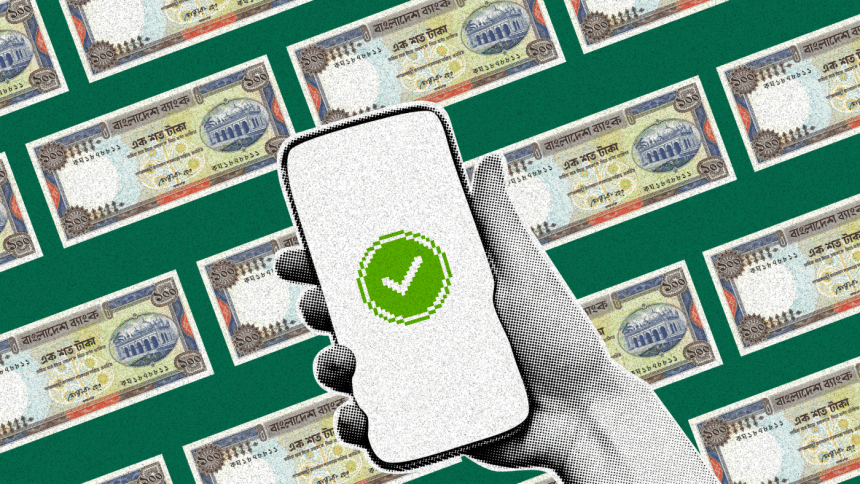What's next for Digital Financial Services in Bangladesh?

Bangladesh's digital payments infrastructure has undergone multiple shifts over the past few years, with Mobile Financial Services (MFS) emerging as a key contributor. During the Covid-19 pandemic, mobile money played a crucial role in enabling millions of people to access digital financial services (DFS) for their daily needs. As the impact of the pandemic eased, mobile money usage surged in 2022, surpassing pre-Covid levels.
The habit of using digital payments, enforced by the pandemic, has become deeply ingrained for many, indicating a fundamental shift in consumer behaviour. Amidst pandemic-induced lockdowns and restrictions, the reliance on digital payments, including mobile money, has surged globally, contributing to the rapid expansion of registered accounts and active usage. Looking at the post-Covid figures, total MFS transactions have increased nearly threefold from 2020 till H '1 2024.
Barriers to scaling DFS in Bangladesh
Barriers to scaling digital financial services (DFS) in Bangladesh are numerous despite the introduction of innovative products catering to diverse consumer and business needs. Mobile Financial Services (MFS), digital wallets, digital nano loans, and online payment platforms have become integral to daily financial transactions. However, the country's digital payments infrastructure requires significant development to reach its full potential.
One major challenge is the absence of interoperability across platforms, which raises transaction costs and complicates the seamless transfer of funds between financial systems. This lack of connectivity fragments the payments ecosystem and results in user friction, as consumers are forced to cash in and out frequently when navigating different services. Enhanced interoperability would enable smoother, cost-effective digital transactions and contribute to a more cohesive financial system.
Another issue is the insufficient adoption of security standards. Payment security frameworks like the Payment Card Industry Security Standards Council (PCI-SSC) and EMV are critical for safeguarding transactions, yet their slow implementation leaves systems vulnerable to fraud and cyberattacks.
A lack of incentives to encourage digital transactions further impedes the adoption of electronic payment systems. Government and regulatory bodies need to take proactive steps to offer incentives that drive greater integration and use of DFS solutions.
Poor internet connectivity, particularly in rural areas, also hinders the effective deployment of electronic payment systems. Slow and expensive internet, coupled with events like the recent six-day nationwide internet shutdown, has caused significant damage to the IT industry and eroded consumer trust in digital financial services.
Additionally, the dual role of regulatory bodies as operators in the payment ecosystem creates conflicts of interest. This overlap can result in biased decisions that stifle innovation and inhibit fair competition among stakeholders, ultimately undermining the development of a dynamic and inclusive digital financial ecosystem.
Designing a blueprint for a robust payments infrastructure
To understand the challenges in the infrastructure, it is important to learn the key elements and how they piece together to form an ecosystem.
Digital identification
Bangladesh has taken leaps in developing digital identification systems, particularly with the rollout of Smart NIDs and Bangla QR. These initiatives aim to streamline transactions, enhance security, and improve access to government services. The Bangla QR system facilitates cashless transactions, while smart IDs offer secure authentication for individuals accessing various services.
However, challenges remain in ensuring universal adoption and interoperability across different platforms and services. India's Aadhaar system revolutionised digital identification by providing a unique biometric ID to over 1.2 billion individuals, facilitating access to financial services and government benefits. While the e-KYC process has become much more efficient, there is still room for improvement in achieving widespread adoption and integration across various services.
Interoperability
The Central Bank of Bangladesh, in collaboration with the ICT Division, established the Interoperable Digital Transaction Platform (IDTP) known as 'Binimoy' in 2022. This initiative aimed to overcome the prevailing fragmentation among MFS providers and Payment Service Providers (PSPs), which inhibited seamless money transfers across different platforms.
While the initiative held promise for enhancing financial accessibility, its implementation faced hurdles. Private sector entities took a lead role in the development process, resulting in a lack of comprehensive user testing and pilot programs. Consequently, the platform encountered security vulnerabilities, leading to instances of financial malpractice within days of its launch.
Data security
While Bangladesh has taken steps to enhance data security measures, including the enactment of the Data Security Act, there are still gaps in enforcement and compliance. Strengthening data security protocols, implementing encryption standards, and fostering a culture of cybersecurity awareness are essential steps to safeguarding digital assets and preventing unauthorised access or data breaches. The vulnerability of data security has been magnified with the hacking of 25 local websites leaking sensitive information of various stakeholder groups. Bangladesh's data security and consent frameworks are still evolving, with opportunities to strengthen user rights and privacy protections.
In comparison, Singapore has stringent data protection laws, such as the Personal Data Protection Act, ensuring high standards for data security. Bangladesh can draw inspiration from Singapore's approach to data governance and explore opportunities for collaboration and knowledge sharing in developing robust data protection frameworks.
Data repository
While Bangladesh has made strides in its digital transformation journey, particularly within the MFS segment and the advent of digital banking guidelines, the establishment of a robust data repository remains a pivotal component that is yet to be fully realised. Drawing inspiration from India's DigiLocker, Bangladesh can leverage innovative solutions to propel its digital infrastructure forward.
The key benefits of a digital data repository are numerous. By deploying multi-factor authentication services, such a repository provides users with full control over their information, thereby enhancing privacy and data protection. Additionally, digitally stored documents streamline bureaucratic processes, eliminating inefficiencies and reducing the burden of carrying numerous physical documents. This digital transformation simplifies verification and submission procedures, offering significant convenience to users. It accommodates various document formats and facilitates digital signatures, simplifying the verification and submission process.
Global insights: How India and Singapore shaped their infrastructure
While India and Singapore showcase advanced, integrated payment infrastructures with strong regulatory frameworks, interoperability, and consumer trust, Bangladesh is still developing its digital financial ecosystem. The country's ongoing efforts, particularly in mobile financial services and digital identity, reflect a commitment to improvement, but challenges remain. To enhance its payments infrastructure, Bangladesh can draw lessons from the successes of India and Singapore in establishing regulatory clarity, promoting interoperability, and driving consumer adoption.
Regulatory framework
Singapore has a well-established regulatory framework overseen by the Monetary Authority of Singapore (MAS), which promotes innovation while ensuring consumer protection and financial stability. The Payment Services Act (2019) consolidates the regulation of various payment services, providing clear guidelines for operations and licensing. This regulatory clarity fosters a competitive environment that encourages the entry of fintech companies.
Additionally, the Personal Data Protection Act (PDPA) offers a balanced approach to personal data protection by regulating the collection, use, disclosure, and care of personal data. It applies to all private sector organisations, regardless of size, ensuring that a wide range of entities adhere to data protection principles. Central to the PDPA is the emphasis on obtaining consent from individuals before collecting, using, or disclosing their personal data. This empowers individuals to have control over their personal information and promotes transparency in how organisations handle data. In contrast, Bangladesh's regulatory landscape is still evolving, with overlapping roles among regulatory bodies that can hinder innovation and create conflicts of interest.
State of interoperability
Singapore's payment ecosystem is characterised by high interoperability among various payment systems, facilitated by initiatives like Fast And Secure Transfers (FAST) and Singapore Quick Response Code (SGQR). These systems enable seamless transactions between banks and payment service providers, enhancing user experience.
On the other hand, India's Unified Payments Interface (UPI) excels in interoperability, enabling seamless transactions across platforms. It features QR-based payments where customers can scan merchant-displayed codes for easy transfers. UPI's layered architecture enhances scalability and flexibility by building on existing systems.
Consumer education and trust
Government and regulatory bodies like the Reserve Bank of India (RBI) have launched large-scale campaigns, such as the 'RBI Kehta Hai' initiative, aimed at educating consumers on the safe use of digital payments, which has boosted trust and reduced apprehensions around security issues.
Way forward
To develop a robust layered payments infrastructure, it is essential to evaluate existing systems and identify areas for improvement and integration. A crucial first step is addressing the digital divide, which forms the cornerstone of an inclusive payments ecosystem. This gap encompasses disparities in access to smart devices, internet connectivity, and digital literacy. Initiatives to subsidise smart devices, lower transaction costs, and extend reliable internet to rural areas must be prioritised. Additionally, introducing value-added services such as micro-credit and conducting financial literacy programs can drive adoption among underserved populations, creating a more equitable and inclusive payment ecosystem in Bangladesh.
By refining and "stacking" these systems, Bangladesh can achieve seamless digital payment operations. In the presence of an interoperable digital platform, a ripple effect can be generated across multiple sectors, encouraging key players to adopt these services and collaboratively address market demand.
While the country has embraced the growth of digital financial services over the years, the road ahead demands a coordinated and deliberate approach. Strengthening interoperability, enhancing data security, and fostering digital literacy are vital steps toward a robust, layered payment infrastructure. By addressing regulatory challenges and ensuring seamless integration across platforms, Bangladesh can unlock the full potential of its digital economy, driving financial inclusion and sustainable growth for the future.
Ameera Fairooz is a consultant at LightCastle Partners with a background in International Business from Dhaka University.

 For all latest news, follow The Daily Star's Google News channel.
For all latest news, follow The Daily Star's Google News channel. 








Comments